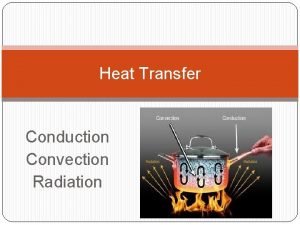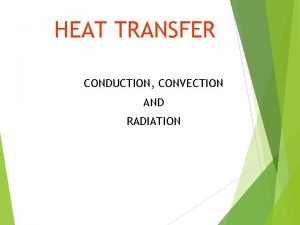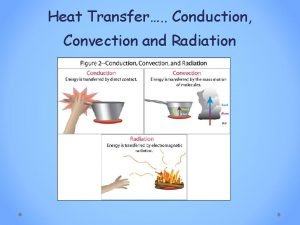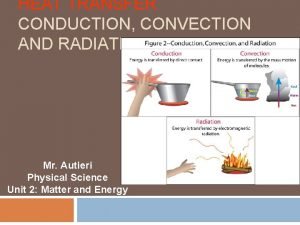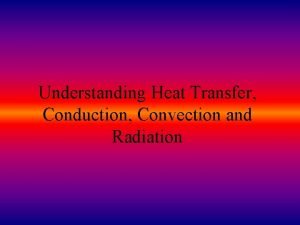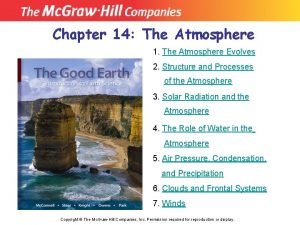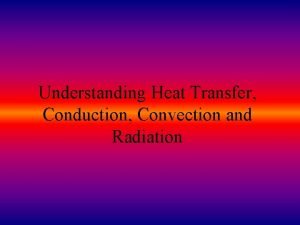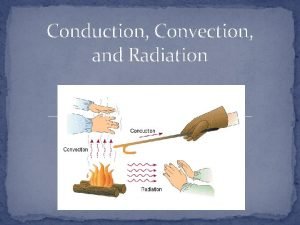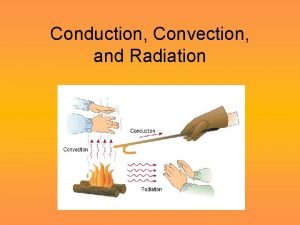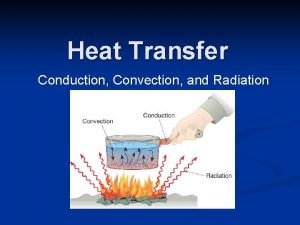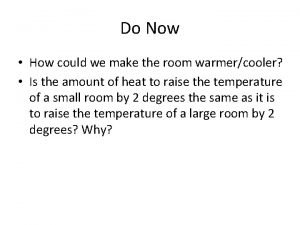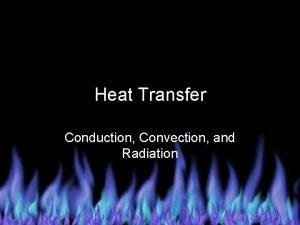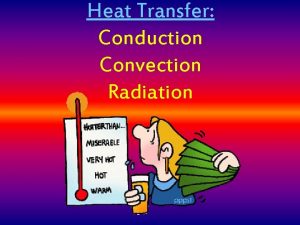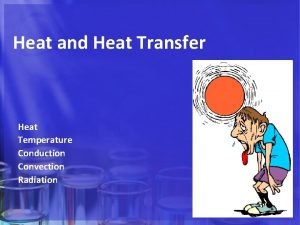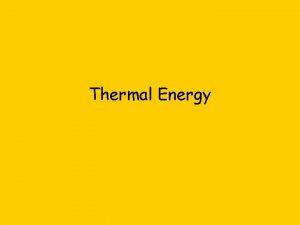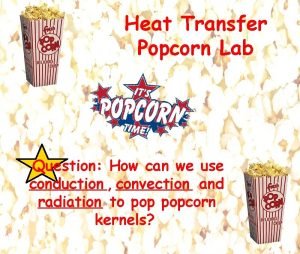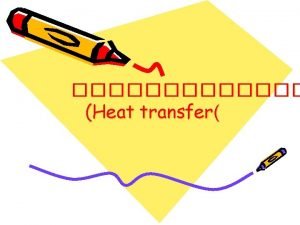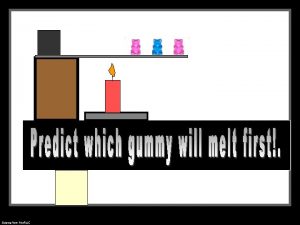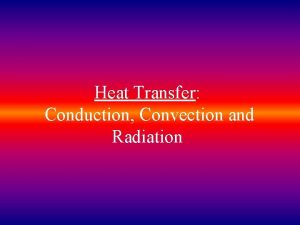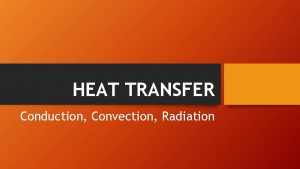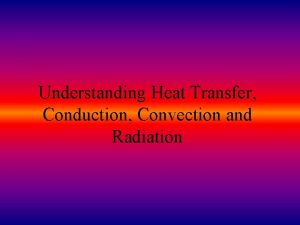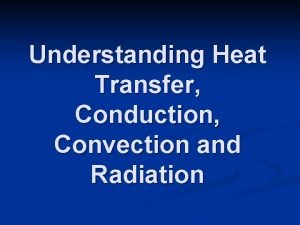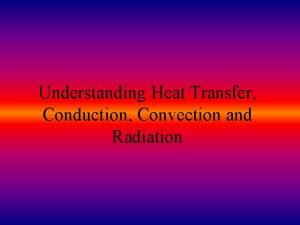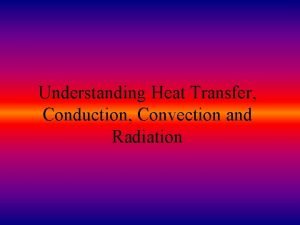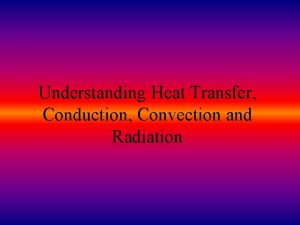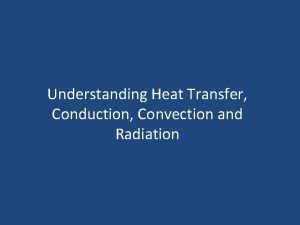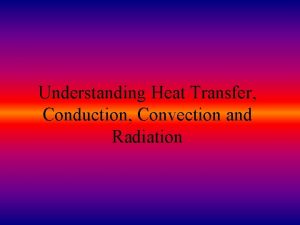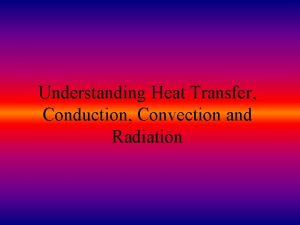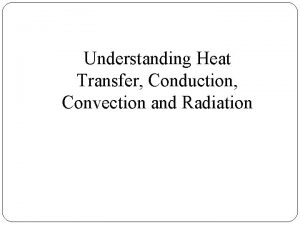Understanding Heat Transfer Conduction Convection and Radiation Heat


















- Slides: 18

Understanding Heat Transfer, Conduction, Convection and Radiation

Heat Transfer • Heat always moves from a warmer place to a cooler place. • Hot objects in a cooler room will cool to room temperature. • Cold objects in a warmer room will heat up to room temperature.

Question • If a cup of coffee and a red popsickle were left on the table in this room what would happen to them? Why? • The cup of coffee will cool until it reaches room temperature. The popsickle will melt and then the liquid will warm to room temperature.

Heat Transfer Methods • Heat transfers in three ways: – Conduction – Convection – Radiation – http: //www. wisconline. com/objects/index_tj. asp? obj. ID=SCE 30 4

Conduction • Conduction is the transfer of heat between substances that are in direct contact with each other. The better the conductor, the more rapidly heat will transfer.

Conduction When you heat a metal strip at one end, the heat travels to the other end. As you heat the metal, the particles vibrate, these vibrations make the adjacent particles vibrate, and so on, the vibrations are passed along the metal and so is the heat. We call this? Conduction

Why does metal feel colder than wood, if they are both at the same temperature? Metal is a conductor, wood is an insulator. Metal conducts the heat away from your hands. Wood does not conduct the heat away from your hands as well as the metal, so the wood feels warmer than the metal.

Convection • Convection is the up and down movement of gases and liquids caused by heat transfer.

Water movement Cools at the surface Cooler water sinks Convection current Hot water rises

Why is it windy at the seaside?

Cold air sinks Where is the freezer compartment put in a fridge? It is put at the top, because cool air sinks, so it cools the food on the way down. Freezer compartment It is warmer at the bottom, so this warmer air rises and a convection current is set up.

Radiation • When electromagnetic waves travel through space, it is called radiation. When the waves come in contact with an object, the waves transfer the heat to that object.

The third method of heat transfer How does heat energy get from the Sun to the Earth? ? There are no particles between the Sun and the Earth so it CANNOT travel by conduction or by convection. RADIATION

1. Which of the following is not a method of heat transfer? A. Radiation B. Insulation C. Conduction D. Convection

2. In which of the following are the particles closest together? A. Solid B. Liquid C. Gas D. Fluid

3. How does heat energy reach the Earth from the Sun? A. Radiation B. Conduction C. Convection D. Insulation

4. Which is the best surface for reflecting heat radiation? A. Shiny white B. Dull white C. Shiny black D. Dull black

5. Which is the best surface for absorbing heat radiation? A. Shiny white B. Dull white C. Shiny black D. Dull black
 What is heat transfer conduction convection and radiation
What is heat transfer conduction convection and radiation Conduction, convection radiation examples
Conduction, convection radiation examples Methods of heat transfer
Methods of heat transfer Three ways heat is transferred
Three ways heat is transferred Heat energy transfer
Heat energy transfer Solid liquid venn diagram
Solid liquid venn diagram Venn diagram of conduction, convection and radiation
Venn diagram of conduction, convection and radiation Radiation heat transfer
Radiation heat transfer What is radiation examples
What is radiation examples Convection conduction radiation
Convection conduction radiation Ex of radiation
Ex of radiation Whats conduction convection and radiation
Whats conduction convection and radiation Following charting convection used in work study
Following charting convection used in work study Whats conduction convection and radiation
Whats conduction convection and radiation Type of thermal energy transfer
Type of thermal energy transfer Temperature, conduction, convection, radiation.
Temperature, conduction, convection, radiation. Bellringer conduction convection or radiation
Bellringer conduction convection or radiation Heat transfer popcorn lab
Heat transfer popcorn lab Conduction convection radiation equations
Conduction convection radiation equations
